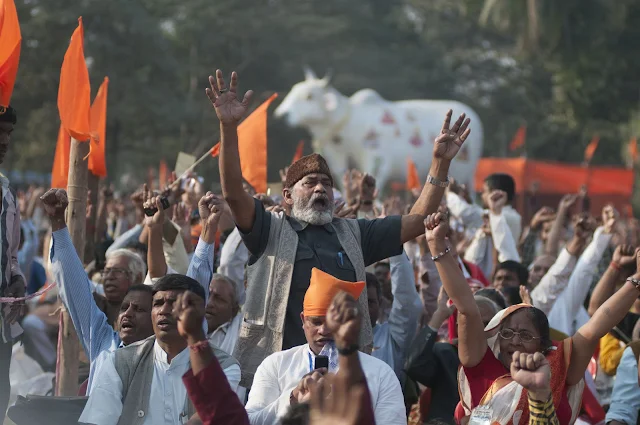Hindutva politics claims to be rooted in integral humanism and Gandhian socialism as its foundational principles. The BJP has incorporated these principles into its party constitution and regards them as its core pillars of its politics. However, in practice, it follows a politics of othering minorities and depriving marginalized communities while accelerating the crony capitalism established by the Congress Party. The promises of "Sab Ka Saath, Sab Ka Vikas, Sab Ka Vishwas, Sab Ka Prayas" (Together with all, development for all, trust of all, and efforts from all) remain mere populist slogans of the Hindutva poster boy, Prime Minister Narendra Modi. Despite coining these slogans, he has also referred to minorities as Ghuspeti (intruders or infiltrators) in India. The gap between Hindutva’s ideological claims and its real-world political practice conceals the fascist strategies underlying its exclusionary politics.
Hindutva led by the BJP promised the working masses fair wages and fair prices by opposing neoliberalism. However, after coming to power, it ensured that there were no obstacles to neoliberal capitalism while brutally suppressing peaceful farmers' protests using state and police force. Hindutva-led governments, under both Atal Bihari Vajpayee and Narendra Modi, have impoverished the working masses, pushing them into the informal sector without any job security. During election campaigns, Hindutva leaders promised employment for the unemployed, but once in power, they deepened the crisis of joblessness. The Modi government and his allies have dismantled trade union laws and workers' rights, introducing arbitrary anti-union policies to further exploit the working class.
Modi is not only the poster boy of Hindutva politics but also the flag bearer of unfettered neoliberal economic policies. The toxic of Hindutva neoliberalism has devastated the rural economy and destroyed the livelihoods of the rural masses. By deepening the agrarian crisis through its commitment to neoliberal capitalism, it has pushed peasants further into poverty. Meanwhile, the urban poor struggle with low wages and an insecure informal economy, where servitude defines both the working culture and conditions. The exploitation of rural and urban labour remains central to the growing profits of crony capitalism, which Hindutva politics has only accelerated.
Hindutva politics and neoliberal economy led by the BJP promised a strong, developed and united India in its constitution. However, its divisive politics have fragmented the nation and weakened its independent foreign policy, making it subservient to Yankee imperialism. Additionally, it has undermined both the welfare state and the Indian constitutional values on everyday basis. Betrayal has historically been the foundation of Hindutva politics which continues to exhibit in the actions and policies of the BJP government led by Mr Modi.
The reactionary politics and economic policies of Hindutva, led by the BJP and shaped by the RSS, create conditions of destitution and deepen various forms of misery among marginalized communities and the working masses. These forces promote a culture of fear toward Muslims and other religious minorities. This atmosphere of fear normalizes the centralization of neoliberal economic policies and political power, while also conditioning citizens to align with the demands of Hindutva-driven capitalism and fascism in India. Therefore, centralisation project of Hindutva politics is requirement for the standardisation of diverse cultures concomitant with the requirements of capitalism in India.
The BJP government and its ideology of Hindutva have nothing progressive to offer to the working people of the country. The Hindutva government does not care to develop policies to address issues of hunger, homelessness, unemployment, low wages, rising prices, weakening of workers’ rights. It prioritises needs and requirements of crony capitalism than the basic needs of working people. Hindutva politics does not seek to improve the material conditions of the working class but instead distracts from economic hardships by exhibiting religious and social polarization to divert mass attention from the failures of the BJP government.
The hopes of working people in Hindutva politics ultimately lead to hopelessness. The class character of Hindutva is fundamentally different from that of the working class. Hindutva inflicts mass misery upon the working people to safeguard the interests of the capitalist class. Mass disappointment defines Hindutva politics, shaping the country's economic policies and development trajectory. Therefore, to safeguard interests of the masses, the working people of India must withdraw their trust from Hindutva politics and align with working class movements that genuinely represent their economic and social well-being.


Comments